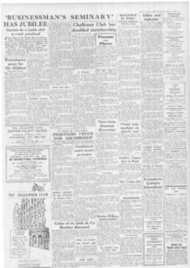Page 1, 11th January 1952
Page 1

Report an error
Noticed an error on this page?If you've noticed an error in this article please click here to report it.
Tags
Share
Related articles
Abbot And Diplomat
New Jesuit Provincial
Fr. Ctjthbert Cary-elwes
Seminary Changes
American Jesuit For Heythrop College
Famous Jesuit moral theologian
FR. HENRY DAVIS DIES AT 85
FR. Henry Davis, SI., one of the leading professors of moral
and pastoral theology in the English-speaking world, died on Friday at Heythrop College, Chipping Norton, Oxon. He was 85.
For over 40 years Fr. Davis taught moral and pastoral theology to the theological students of the English province of the
Society of Jesus.
Always a student and an indefatigable worker, Fr. Davis embodied the results of his wide reading and assiduous study in a four-volume work entitled Moral and Pastoral Theology, which was first published in 1935 and has gone through several editions,
He has also written a number of smaller works. mostly on modern moral problems, as well as pamphlets published by the Catholic Truth Society and by the Irish Messenger. He has also contributed countless articles to periodicals like. The Month. Irish Ecclesiastical Record, and Ecclesiastical Review, and was frequently called upon to read papers at meetings of doctors, nurses, lawyers, chemists and other professional men as well as to conferences of higher studies.
Innumerable, too, were the cases of conscience submitted to him, and in solving them and giving his opinion he was ever most painstaking and thorough.
might seem heavy and remote. was known for the real courtesy of a man of charity.
He never spoke ill of people; and he would go to any trouble to help his students and community.
His large humanity, is shown also by his excellence as a teacher; he knew all the difficulties and all the questions—and he had a memorable way of putting these.
" What would you do." he asked an examination candidate who up to that point knew all the answers, "if you did not know what to do?"
Above all, his humanity appeared in the instinctive soundness of his judgment. Not only did he know his Christian principles, he also knevs and loved people.
blog comments powered by Disqus







